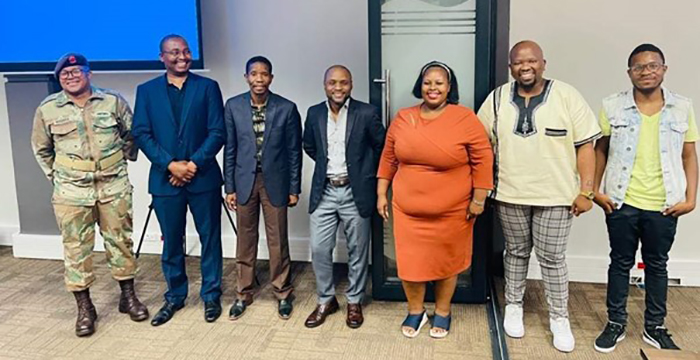College of Law
Saving the youth from gangsterism
A day after its incisive seminar on decolonisation, the College of Law hosted a hybrid seminar entitled "Socio-legal Linkages Between Youth Gangsterism and Armed Conflicts in Africa". This seminar was held on 21 October 2022 on Unisa’s Main Campus and featured prominent speakers from the Conflict and Forced Migration Research Institute, military legal practitioners from the South African National Defence Force (SANDF), the Unisa Law Clinic and the College of Law. The seminar was opened by Dr Lebogang Morodi, Director of the School of Criminal Justice in the College of Law. Dr Morodi welcomed the speakers and guests on behalf of the Acting Executive Dean, Prof OJ Kole.

From left: Major Andries Moekoa (SANDF), Prof Angelo Dube (Acting Manager, Office of Strategic Projects), Dr L Morodi (Director, School of Criminal Justice), Mr Lunga Dweba (Conflict and Forced Migration Research Institute), Ms Thembisile Mahuwa (Unisa Law Clinic), Mr Sikelela Ndlazi (PCILAW) and Mr Tendani Musekwa (Student assistant at PCILAW and LLB candidate, Unisa)
Increase in violent crimes
The panellists highlighted that South Africa continues to experience an increase in violent crimes, including murder, assault and rape, all of which occur in homes on streets, on beaches, in parks and on public transportation. These violent crimes indicate that South Africa is becoming a dangerous country to live in. They also reveal a frightening fact: the reported contact crimes are higher than in countries experiencing active armed hostilities, leading to the inescapable reality that South Africa is technically at war with itself.
The panellists analysed the many reasons for these crimes, including a hostile socio-economic environment that drives many people to crime. These crimes include the peddling of illicit drugs that are pushed by organised formations like gangs in schools and youth centres. These places are recruitment grounds for gangs, particularly in the Western Cape Province. As such, gangsterism is linked to increasing drug production, smuggling and trafficking. It was also highlighted that although the police are fighting these gangs, the President recently had to deploy members of the SANDF to combat gangsterism in the Western Cape. This points to the reality that while disrupting and neutralising gangs are necessary, gang violence is more than just crime – it is organised conflict that cannot be dealt with effectively under domestic policing legislation.
The deployment of the SANDF in the Western Cape
The panellists argued that the deployment of the SANDF to fight gangs in the Western Cape reveals the magnitude of the threat posed by gangs, and that while the President may deploy the SANDF on domestic soil to support the South African Police Service (SAPS) in accordance with the Constitution, there is a grey area on the question of which legal framework applies when members of the SANDF quell armed gangs: domestic policing legislation or international humanitarian law? They analysed the challenges of determining the point at which the involvement of the SANDF in fighting gangs transcends from supporting domestic policing to actively confronting an armed conflict. In the light of these questions and the general situation with gangs in South Africa it was shown that there is an urgent need to save the youth in South Africa from gangsterism. Should this need remain unattended, gangs might provide fertile ground for exploiting the youth and involving them in bigger conflicts.
The seminar closed with a word of thanks from Dr Morodi, who expressed gratitude to the panellists, guests, college and students for attending and contributing to the discussion.
The seminar was a huge success, with more than 75 people in attendance physically and many more participating via the online MS Teams platform. It provided a platform to interrogate the linkages between law, gangsterism, law enforcement and army deployment in civilian policing operations. It also gave birth to ideas on expanding this initiative in the coming year.
* By Prof Felix Dube, Postdoctoral fellow, Department of Public, Constitutional and International Law
Publish date: 2022/11/07

 Unisa co-hosts G20 community outreach in the Eastern Cape
Unisa co-hosts G20 community outreach in the Eastern Cape
 Unisans gain membership of prestigious science academies
Unisans gain membership of prestigious science academies
 Advocating for disability transformation through servant leadership
Advocating for disability transformation through servant leadership
 Unisa Press continues to illuminate the publishing space
Unisa Press continues to illuminate the publishing space